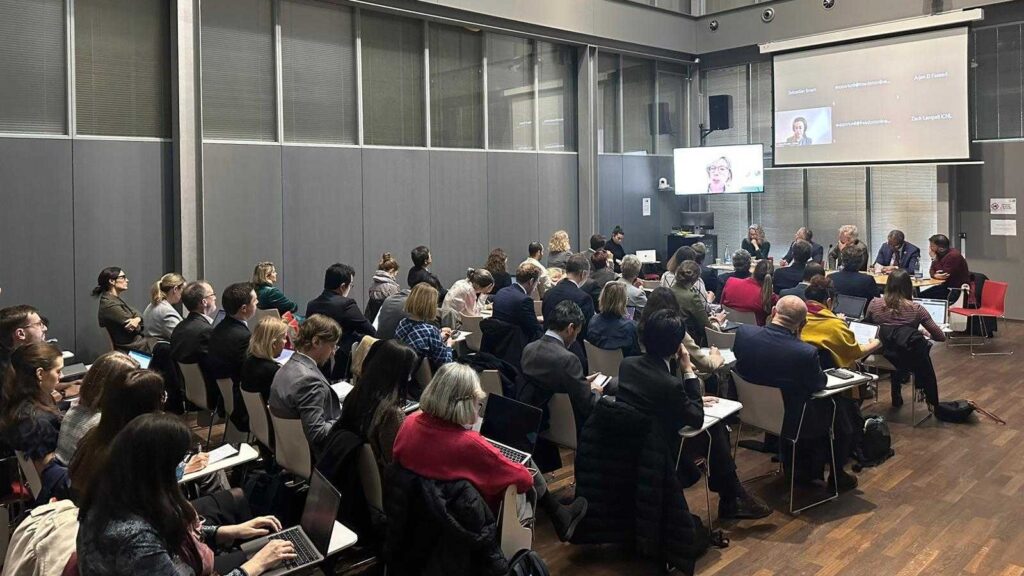On Wednesday, 24 January, the Netherlands, as Chair of the Freedom Online Coalition (FOC) in 2024, hosted the event “Advancing Human Rights in the Geneva Digital Ecosystem” to kick-off this year’s work of the FOC Geneva Diplomatic Network. The event was attended by FOC Member States’ Ambassadors and Permanent Representatives in Geneva, experts and working-level representatives, FOC Advisory Network members, prospective members, and other stakeholders.
The event commenced with a coordination meeting between FOC Member States, where the Kingdom of the Netherlands presented the FOC Program of Action 2024, and discussed its implementation through the Geneva network with Coalition Members. Member States overviewed planned activities, and discussed opportunities to advance a human rights-based and multistakeholder approach to the governance of the Internet and artificial intelligence technologies, and efforts to address ongoing challenges to Internet freedom in Geneva-based fora, including the UN Human Rights Council, the World Summit on the Information Society +20 (WSIS+20) Review Forum, the Commission on Science and Technology for Development, and the AI for Good summit.
To foster dialogue between the FOC, FOC Advisory Network, and other stakeholders on the promotion of responsible and human rights-respecting AI, the event featured an interactive session with remarks provided by Mehdi Snène, Secretariat Member for the UN High-Level Advisory Board on Artificial Intelligence; Isabel Ebert, Policy Advisor at the OHCHR B-Tech Project; Jovan Kurbalija, Executive Director of the Diplo Foundation; Olivier Alais, Programme Coordinator, Digital Rights & Access at ITU Telecommunication Standardization Bureau; Francesca Bosco, Chief Strategy and Partnership Officer of the Cyber Peace Institute, and moderated by Maria Paz Canales, Head of Legal, Policy and Research at Global Partners Digital. Participants explored in practice how existing international human rights law and standards can be utilised to ensure the responsible design, development, deployment, and use of AI systems, and how human rights concerns and safeguards can be integrated into the AI life-cycle to promote responsible and human-rights respecting AI.

Following the interactive session, Ambassador of the Kingdom of the Netherlands to the UN, WTO and other International Organisations in Geneva Paul Bekkers welcomed FOC Ambassadors and Permanent Representatives. The event continued with a roundtable featuring Peggy Hicks, Director of the Thematic Engagement, Special Procedures and Right to Development Division in the OHCHR; Frederic Werner, Head of Strategic Engagement and Chief of Strategy & Operations for the AI for Good at the ITU Telecommunication Standardization Bureau; Renata Dwan, Special Adviser to the UN Secretary-General’s Envoy on Technology; Konstantinos Komaitis, non-resident fellow with the Democracy + Tech Initiative of the Atlantic Council’s Digital Forensic Research Lab; Chengetai Masango, Head of the UN Secretariat for the IGF; Elena Plexida, Vice President for Government and IGO Engagement at ICANN, and moderated by Ernst Noorman, Ambassador-At-Large for Cyber Affairs of the Kingdom of The Netherlands.
The roundtable discussion centred around mapping the opportunities and challenges around human rights and digital technologies in the Geneva landscape and in the context of wider Internet and AI governance discussions, including the Pact of the Future and Global Digital Compact in 2024, and the lead up to the WSIS+20 Review in 2025. The speakers highlighted the importance of placing human rights at the centre of these processes to ensure a future in which digital technologies contribute to the global public good, and emphasised the necessity to protect the multistakeholder model of the Internet by strengthening global public and private partnerships, including through the FOC.
